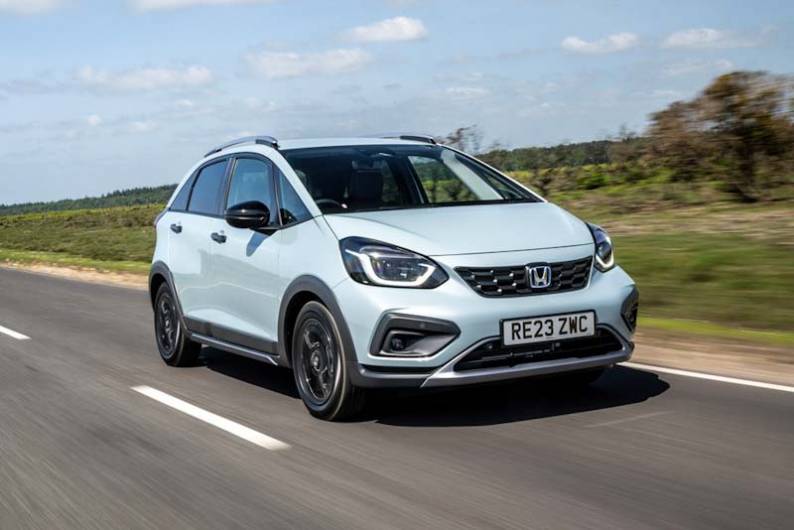
RAC sale – up to 33% off*
• Roadside cover from £5.29 a month†
• We get to most breakdowns in 60 mins or less
• Our patrols fix 4/5 breakdowns on the spot

Honda's fourth generation Jazz supermini delivers more of a lifestyle feel in this Crosstar form. Jonathan Crouch takes a look at the improved version.
Ten Second Review
The Jazz Crosstar is intended by Honda to bring more of a lifestyle vibe to the Jazz supermini range and, like the standard model, gets a full hybrid engine. With the Crosstar, now lightly improved, there's most of what you'd get with a small SUV - including a bit of extra ride height. But none of the crossover compromises you won't want to make if at heart you're still a supermini buyer.
Background
These days, if you don't have exactly the right kind of SUV-style crossover model for every conceivable market segment, it seems you have to create one. This trend is perhaps most obvious at the smallest end of the crossover market. If your brand doesn't have a really small SUV model in the style of a Nissan Juke or a Volkswagen T-Cross, it's a potential problem. Which is why Ford had to jazz up its Fiesta supermini to create the Fiesta Active. And Audi felt the need to rugged-ise the A1 to create the A1 Citycarver.
Honda is in much the same boat. For crossover buyers, it doesn't have anything smaller than the HR-V. Hence the reason why the brand's fourth generation Jazz supermini range includes the SUV-style Crosstar model we going to look at here. Changes over the standard car are fairly minimal, so there's the same full-hybrid engine under the bonnet and the same clever 'Magic seat' system inside. But this Crosstar variant will make much more of a statement on the school run. And has recently been usefully improved.
Driving Experience
Thanks to a 37mm increase in ride height, the Crosstar version of this Jazz should be able to offer increased suspension travel, but any benefit is difficult to sense on the road in comparison with the standard version. There are no mechanical changes over the ordinary car and there's no kind of front wheel grip control system either. Like all current Jazz models, this one comes only with one engine - the brand's e:HEV powertrain. This is a full-Hybrid unit - so properly electrified like a Toyota Yaris Hybrid, rather than being only mildly electrified like the MHEV unit you can now have in a Ford Fiesta. The difference is important because a full-Hybrid can have far more reliance on battery power, especially in urban conditions. In this case, it's a 1.5-litre unit which uses two electric motors and a compact lithium-ion battery pack. The combustion engine sends drive through a clever fixed-gear auto transmission which Honda says has been revised to improve smoothness and driveability; it's certainly better than the belt-driven CVT set-up that Toyota uses in its Hybrids. Recent revisions to other parts of the car's clever e:HEV powetrain have seen efficiency, driveability and output increased. The electric drive motor has seen a 14PS increase, taking its total output to 122PS, while the generator motor has also seen an increase in power (8kW), taking it to a peak of 106PS.
Basically the whole set-up is still a downsized version of the 2.0-litre electrified engine used in the CR-V Hybrid and as there, you get selectable drive modes. Most of the time at the wheel of this Honda you'll be in 'Hybrid Drive', which combines the engine and the battery pack in the most efficient way possible while recovering electricity from deceleration and storing it for future use. 'EV Drive' forces the Jazz to run in electric-only mode (though it can only do that for very short distances). And the 'Engine Drive' setting combines the petrol engine and the electric motor output for maximum performance. In this mode, the e:HEV powertrain gives this Jazz a 0-62mph time of 9.9 seconds and a maximum speed of 107mph. This revised model can now tow - up to half a tonne.
Design and Build
The revised version of this Jazz Crosstar features several exterior revisions that heighten its tougher, more adventurous appearance. The more defined grille features a pronounced honeycomb design and is paired with revised bumpers, which feature silver inserts designed to look like underbody protection, and new, matching side skirts. Rounding out the revisions are a smarter finish for the alloy wheels, and the introduction of a new exterior colour: Fjord Mist blue. As before, you also get roof rails and silver-coloured door mirrors with integrated LED indicators. Along with a 37mm ride height increase. And there's the option of 2-tone paint which gives you a gloss black roof, all in an attempt to introduce more of a Crossover vibe to this supermini. As with standard Jazz, this car is pretty compact, measuring in at about 4-metres in length.
Inside, the Crosstar's interior features new seat upholstery as well as revisions to the dash and door cards along with a smarter trim finish for the dashboard, centre console, and minimalist two-spoke steering wheel. As before, there's also water-repellent fabric upholstery. Plus you get a premium audio system. Otherwise it's just as it would be on an ordinary top spec Jazz model. There are wide 'body-stabilising' front seats supposed to reduce fatigue on longer journeys and the dash has a minimalist, uncluttered look. Its centre touchscreen has smartphone-style swipe technology and incorporates wireless 'Apple CarPlay'/'Android Auto' smartphone-mirroring. There's also a digital instrument cluster. Perhaps the best news though, is that Honda's clever 'Magic Seat' design remains in the rear, giving owners the option of either folding the rear bench flat or flipping up the seat bases to create a taller load space. Boot capacity is 298-litres with the rear seat in place - or 1,203-litres with it folded.
Market and Model
Prices for this Jazz Crosstar start from just over £28,000 in the single spec available - about the same as a top-spec 'Advance Sport'-trimmed Jazz supermini without the Crosstar package. You can pay a little extra (just over £600 more) for two-tone paint, but otherwise there aren't too many other options. Standard features include adaptive cruise control, lane keep assist and automatic headlights, plus there's 'Apple CarPlay' and 'Android Auto' smartphone-mirroring.
Infotainment and connectivity benefit from a sophisticated voice command system, the Honda 'Personal Assistant', first seen on the little Honda e. This is basically a next-generation voice control system in that it can respond to multiple commands: for instance "OK Honda, find me an Indian restaurant with WiFi and free parking". The set-up would then display suitable options on the fascia's central touchscreen before plotting a route to the chosen destination. With this car, Honda is also offering the latest version of its Honda+ smartphone app, which includes remote vehicle locking and unlocking, plus 'intelligent geofencing', which alerts an owner if the vehicle breaches a pre-set 'geofence' zone. Plus there's the ability to send journey information from the app to the car's navigation system.
Cost of Ownership
You'd hope that with all that hybrid technology on board, this Jazz would be a frugal thing and, by and large, it is. The Crosstar model has claimed WLTP-rated combined cycle economy and emissions figures of 58.9mpg and 109g/km (down from 62.8mpg and 102g/km in the standard model). Insurance is group 19A. Many customers will want to budget ahead for scheduled maintenance with fixed-price scheme called 'Five'. It includes five years' worth of maintenance, an extended warranty for this period and roadside assistance breakdown cover should the unexpected happen. This can be transferred to a new owner if you sell the car before the service plan has expired.
Residual values are expected to be significantly better than most other supermini segment rivals. And the three year 90,000 mile warranty is better than the package you get from many competitors too. In addition, surface corrosion is covered for three years, exhaust corrosion is covered for five years, chassis corrosion is covered for ten years and structural corrosion for twelve years.
Summary
There are two schools of thought when it comes to reviewing cars like this. Some see them as cynical marketing exercises, models that pretend SUV-ness but without any real substance. Others take the view that most purpose-designed small crossovers lack much SUV substance anyway, so in many ways, choosing a dressed-up lifestyle-orientated supermini makes just as much sense. We incline towards the latter view - as will folk interested in this Jazz Crosstar.
It's about as suited to off piste motoring as a Land Rover Defender is to a racetrack, but that won't trouble those who visit a Honda showroom in search of a standard Jazz, then spot one of these in the corner. It is, as Honda says 'a hybrid to fit into your life'.







